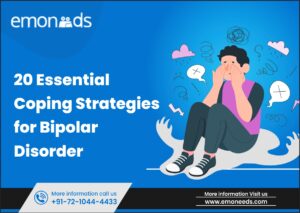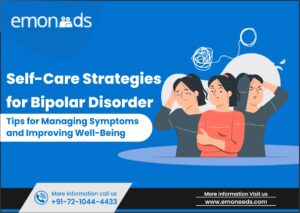Bipolar Disorder Treatment At Home
Bipolar Disorder Treatment At Home
Wed, 10 Jan 2024
Are you searching for bipolar disorder supportive therapy at home? Emoneeds is one of the best online platforms for bipolar disorder treatment. Here, all the doctors are certified and carry years of experience.
Bipolar disorder, or manic-depressive illness, is a mental health condition. It is characterized by extreme mood swings, including episodes of high energy and activity levels (mania or hypomania) and periods of depression. People with bipolar disorder may experience intense emotional states, erratic behavior, and difficulty functioning in everyday life. Some researchers suggest that bipolar disorder may be related to genetic, environmental, and neurobiological factors.
Table of Contents
ToggleCommon triggers for bipolar episodes include stressful life events, disruptions in sleep patterns, and certain medications or substances. Here will explore various treatment options for bipolar disorder along with bipolar disorder supportive therapy that can be administered from the comfort of one’s home.
Cognitive Behavioral Therapy for Bipolar Disorder
Cognitive-behavioral therapy (CBT) can effectively treat bipolar disorder. CBT focuses on identifying and changing negative patterns of thought and behavior that can contribute to bipolar symptoms. It improves the patient’s ability to cope with stressors and develop healthy coping skills. Some specific techniques used in CBT for bipolar disorder include cognitive restructuring, behavioral activation, and problem-solving skills training.Treatment with CBT focuses on identifying problems and your reactions to them. It then helps you replace these reactions with more objective, balanced thoughts. A good treatment outcome is one in which the mood episodes are stabilized and the patient is equipped with the cognitive and behavioral skills necessary to become more aware of triggers and how to manage them more effectively.Interpersonal and Social Rhythm Therapy for Bipolar Disorder
Interpersonal and Social Rhythm Therapy (IPSRT) stabilizes daily routines and improves relationships with others. It combines psychoeducation, behavior modification, and interpersonal therapy to manage mood symptoms and prevent relapse. The therapy emphasizes the importance of maintaining regular routines, such as sleep, exercise, and mealtimes, and encourages individuals to develop healthy social relationships to help manage stressors.It outlines techniques to improve medication adherence, manage stressful life events, and reduce disruptions in social rhythms. With this form of therapy, patients learn skills that can help them protect themselves against the development of future episodes. Managing the patient’s symptoms and improving his interpersonal relations is the primary focus of IPSRT.Overall, most individuals with bipolar disorder will need treatment with antipsychotic or mood-stabilizing medications. But psychosocial treatments may be added in order to improve the individual’s functioning, according to the American Psychological AssociationFamily Therapy for Bipolar Disorder
Family therapy can help improve communication, reduce stress, and increase understanding among family members. This therapy focuses on the family as a unit and aims to enhance family relationships, coping skills, and problem-solving abilities. Family therapy can also help identify potential triggers or warning signs for mood episodes and develop strategies for managing them as a family.Advantages of Home-Based Treatment
Home-based treatment for bipolar disorder offers several advantages over traditional treatment options. Firstly, it allows individuals to receive treatment in the comfort of their homes, leading to increased feelings of safety and security. Home-based treatment also provides a more personalized approach to care, with treatment plans tailored to the individual’s specific needs and circumstances. This can lead to better outcomes and a higher likelihood of successful long-term management of bipolar disorder.Furthermore, home-based treatment often involves family and loved ones in the treatment process, which can improve the quality of care and provide additional support for the individual in their journey toward recovery.Setting up a Supportive Home Environment
Creating a supportive home environment is essential for managing bipolar disorder at home. It involves changing your living space, minimizing noise and distractions, creating a daily routine, and setting up a calm and relaxing atmosphere. You can also incorporate healthy habits like regular exercise, a balanced diet, and good sleep hygiene into your daily routine.Communicating openly with your family and friends about your condition and how they can support you is crucial. You can also involve them in your treatment plan by attending therapy sessions or helping you keep track of your medication.Involving Family and Friends in Treatment
Involving family and friends in the treatment process can be important for individuals with bipolar disorder. Not only can loved ones provide emotional support and encouragement, but they can also help with practical aspects of treatment, such as medication management and attending therapy appointments. Family therapy can be beneficial for improving communication and addressing any conflicts or challenges that may arise during the treatment process.It is essential to approach these discussions with sensitivity and understanding and to remember that each individual’s experience with bipolar disorder is unique. Encouraging open and honest communication can help ensure that everyone is on the same page and working towards a common goal of supporting the individual with bipolar disorder.Daily Feedback and Early Warning Signs
Maintaining daily feedback and monitoring for early warning signs is crucial in successfully managing bipolar disorder. By keeping track of mood changes, sleep patterns, and other symptoms, individuals can better understand their condition and take action before a full-blown episode occurs. This information can be shared with healthcare providers to inform treatment decisions and adjustments.Why Choose Emoneeds?
Choosing Emoneeds for bipolar disorder treatment means receiving high-quality, personalized care in the comfort of your own home. Our team of experienced professionals uses evidence-based treatment approaches, including medication management, psychotherapy, and family therapy, to help you achieve long-lasting recovery. We also offer daily feedback and early warning sign detection to catch potential relapses early on. We aim to empower you with the tools and support to manage your symptoms and improve your overall quality of life. With Emoneeds, you can rest assured that you are in good hands throughout your bipolar disorder treatment journey.FAQ’s
1. What is bipolar disorder, and how does it manifest?
Bipolar disorder is a complex mental health condition characterized by severe mood swings. It manifests in two primary phases: manic or hypomanic episodes characterized by high energy, impulsivity, and elation, and depressive episodes characterized by low mood, fatigue, and disinterest. These mood swings can lead to erratic behavior and difficulty in daily functioning.
2. What are some common triggers for bipolar episodes?
Bipolar episodes can be triggered by various factors, including stressful life events such as job loss or relationship problems. Disruptions in sleep patterns, such as insomnia or excessive sleep, can also precipitate episodes. Furthermore, certain medications and substance use can trigger mood swings in individuals with bipolar disorder.
3. Is home-based treatment for bipolar disorder effective?
Home-based treatment can be highly effective for bipolar disorder, particularly for individuals who prefer to receive care in a familiar and comfortable environment. Its effectiveness depends on the customization of the treatment plan to suit the individual’s unique needs and goals. The involvement of healthcare professionals and the support of family and friends can significantly enhance its success.
4. What treatment options are available for bipolar disorder at home?
Home-based bipolar disorder treatment can encompass a range of interventions, including medication, psychotherapy, cognitive-behavioral therapy (CBT), interpersonal and social rhythm therapy (IPSRT), and family therapy. The choice of treatment modality is based on the individual’s specific condition, preferences, and therapeutic goals.
5. How can I create a supportive home environment for managing bipolar disorder?
Establishing a supportive home environment is vital for successful bipolar disorder management. This involves implementing a daily routine that includes regular sleep patterns, consistent exercise, and a balanced diet. Open and effective communication with family and friends is equally crucial. This allows individuals to express their needs and challenges and promotes understanding and collaboration in their treatment journey.
6. Why should family and friends be involved in the treatment process?
Involving family and friends in the treatment process is essential for several reasons. They provide emotional support, understanding, and encouragement to individuals with bipolar disorder. Moreover, they can actively contribute to medication management, attend therapy sessions, and help improve communication within the family. Collaborative efforts enhance the overall effectiveness of the treatment and create a more nurturing environment for recovery.
7. What makes Emoneeds a suitable choice for bipolar disorder treatment at home?
Emoneeds offers a comprehensive and personalized approach to bipolar disorder treatment in the comfort of one’s home. Their team of experienced professionals utilizes evidence-based treatment methods, including medication management, psychotherapy, and family therapy, to empower individuals in achieving long-lasting recovery. Furthermore, Emoneeds provides daily feedback and early warning sign detection, enabling the early identification of potential relapses and proactive intervention to ensure the individual’s well-being.
Our Reviews
I appreciate commitment to my mental health and the positive impact they’ve had on my life. I would highly recommend their services to anyone seeking a skilled and compassionate psychologist.” Yes, I can promote the EMONEEDS.
Neha Properties
Emoneeds has been a real lifesaver for me. Not just saying it, I mean it. Their process, the check-ins, and the super caring team have made a world of difference in my mental health journey. A+ service!
somasekhar reddy
Emoneeds, you guys are doing something special. Your approach to mental health, the custom plans, and the regular check-ins for my daughter, it’s been a support like no other. Keep doing what you’re doing!
Chikki Sukoon






